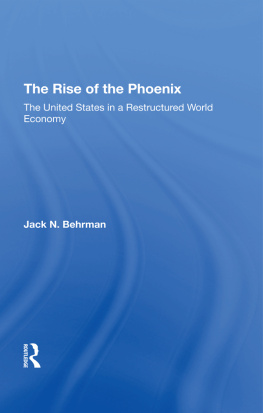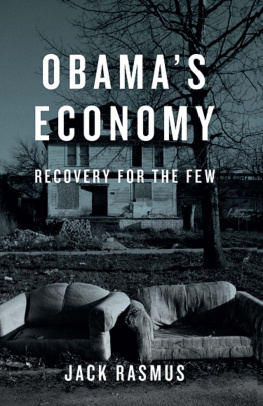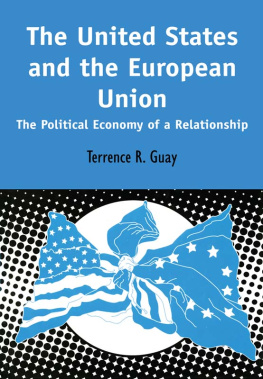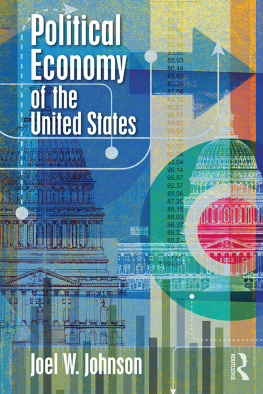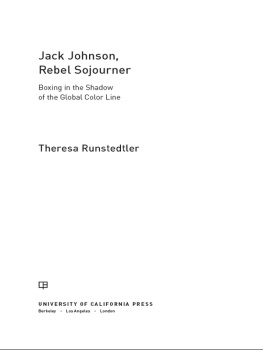The Rise of the Phoenix
The United States in a Restructured World Economy
Published in cooperation with the International Economic Policy Association
First published 1987 by Westview Press
Published 2019 by Routledge
52 Vanderbilt Avenue, New York, NY 10017
2 Park Square, Milton Park, Abingdon, Oxon OX14 4RN
Routledge is an imprint of the Taylor & Francis Group, an informa business
Copyright 1987 Taylor & Francis
All rights reserved. No part of this book may be reprinted or reproduced or utilised in any form or by any electronic, mechanical, or other means, now known or hereafter invented, including photocopying and recording, or in any information storage or retrieval system, without permission in writing from the publishers.
Notice:
Product or corporate names may be trademarks or registered trademarks, and are used only for identification and explanation without intent to infringe.
Library of Congress Cataloging-in-Publication Data
Behrman, Jack N.
The rise of the phoenix.
(Studies in American business and the international
economy)
Bibliography: p.
Includes index.
1. United StatesEconomic policy1981
2. United StatesEconomic conditions1981
3. Economic history1971 . 4. International
economic relations.I. Title.II. Series.
HC106.8.B43 1987 338.973 87-21689
ISBN 13: 978-0-367-29559-2 (hbk)
Contents
, Ronald L. Danielian and Timothy W. Stanley
, Jack N. Behrman
The U.S. economy is in trouble. For once, there is an unusual consensus among expert opinion that the choices are clear, pay now or pay lateror, more accurately, saddle succeeding generations with the enormous burden of our debts to the rest of the world, debts that, sooner or later, are going to have to be paid in one coin or another.
What is lacking is a political consensus on what needs to be done, one that can be translated into effective action by the Executive and the Congress. The message Americans need to hear is that paying means working harder, suffering tax adjustments, and consuming less. But electorates tend to put the messenger of such bad news to death politically, as a former chairman of the Ways and Means Committee and a former vice president running for president found out the hard way.
The lofty goals established after World War II in the Bretton Woods agreements and the institutions they spawned are obsolete and have not adjusted to modern realities. They no longer provide a viable reference point. What is needed is a new vision, a grand design on a world scale that encompasses not only American interests but those of the other industrial countries, the developing world, and even non-market economies. Such a mountain peak, however difficult to attain in practice, can provide the needed line of march for those now struggling to find their way out of the jungle.
In this book, Professor Jack Behrman provides just such a design for the future; what he proposes transcends current arguments about competitiveness, free (or fair) trade versus protectionism, and the erosion of Americas industrial base. Commissioned as part of the International Economic Policy Association and the International Economic Studies Institutes special two-year program on American Business and the International Economy, Dr. Behrmans contribution may well prove to be seminal in the search for new ways of thinking. It draws upon the authors lifetime of experience as both a practitioner (a senior Commerce Department official) and a researcher (Luther Hodges Distinguished Professor at the University of North Carolina) on the issues.
With the customary caveat that the views expressed are those of the author and not necessarily those of the members of the Association or trustees of the Institute, we are honored to sponsor and publish this important context-setting contribution. Other studies in the program recently published or in process will deal with particular aspects of the overall problem in greater detail.
Whatever reservations readers may have about the practicality of certain proposals, we hope they will agree with Dr. Behrmans underlying thesis that the United States itself can no longer direct either the world economy or even its own economic destiny but now must lead, as primus inter pares , in the search for new international patterns. Facing and acting upon unpleasant truths is never easy. But it is best done sooner rather than later, guided by imaginative and courageous political leadership.
Ronald L. Danielian
President
IEPA
Timothy W. Stanley
President
IESI
Chairman
IEPA
The Great Seal of the United States is emblazoned with an eagle; in an earlier design it was a Phoenix, rising out of the ashes. The latter would be much more fitting to represent the condition of the United States today. It has been burnt badly in its role in the world economy, and it must rise again to a position of leadership even though it cannot dominate the necessary restructuring of the world economy.
The major new element in the system is the fact that the United States is no longer the dominant economy, having fallen from nearly 50 percent of the non-Communist GNPs in 1950 to less than 30 percent at present and heading for a level under 20 percent of the worlds GNP by the end of the century. Any new leadership role must be played within a setting of many more participants and greater cooperation than was the case during the formation of the Bretton Woods Agreements, which successfully guided the world for twenty-five years. That success depended on the strength of the U.S. economy (relatively full employment) and on that of the U.S. dollar (stability in the exchanges and in the U.S. price level). Neither condition obtains today nor seems likely in the near future. The United States swayed the international economy until the 1970s; now the situation is reversed. Consequently, the United States cannot dictate; it is merely first among equals.
And in many sectors it is no longer first. Major sectors of U.S. industry, on which the United States has relied for competitive strength, are no longer efficient, having lost technological leadership; and no sector is free from foreign competition, either at home or abroad. Many U.S.-manufactured exports have stagnated, particularly compared to the rapid rise of imports over the past three years. Moreover, adjustment through exchange rates will have excruciating effects on various sectors and standards of living in the United States. Consequently, pressures are high for protectionist measures. But such measures will not meet the problems facing the country. And protectionism would run against the tide of increased international interdependence.
The problems of the United States can be met only by expansionist measuresboth at home and abroad. There are only two ways to redress the present situation unilaterally: through a reduction in real living standards , thereby reducing the inflow of foreign resources (material and financial) and repaying foreign debt; or, through an increase in productivity and production of the U.S. economy , giving the excess to the foreigner to repay our past borrowing and curtail present borrowing. In either case, real production has to be allocated to the foreigner, reducing what is available to U.S. consumerseither currently or potentially through higher production. There is no way to avoid these burdens of adjustment; the only question is who bears how much of them and when.


